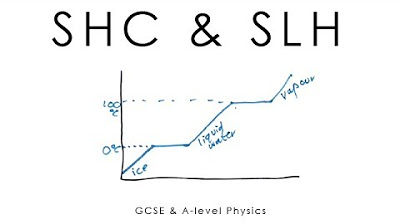Science behind Heat Capacity and Specific Heat Capacity
Summary
TLDRThe script explains heat capacity, focusing on its role in understanding the heat gained or lost by objects. It compares materials like steel and wood, highlighting how different heat capacities affect temperature changes. Heat capacity is defined as the energy required to raise an object's temperature by one degree Celsius. The concept of specific heat capacity is introduced to make heat capacity independent of mass, explaining that different materials have distinct specific heat capacities. The script emphasizes that while the heat capacity varies with mass, the specific heat capacity remains constant for a material.
Takeaways
- ⚡ Heat capacity is one of the factors that helps determine the amount of heat gained or lost by an object.
- 📏 Heat capacity is defined as the amount of heat an object can hold.
- 🌞 A steel plate heats up faster than a wooden plate when exposed to sunlight because steel has a lower heat capacity.
- 🪵 Wood has a higher heat capacity than steel, allowing it to absorb more heat before its temperature rises.
- 💡 Heat capacity is the energy required to increase the temperature of a material by one degree Celsius.
- 🔬 Heat capacity equals the amount of energy required divided by the change in temperature.
- ⚖️ Mass is not explicitly mentioned in the formula for heat capacity but affects the energy needed to raise temperature.
- 🌡️ For a 10 kg object, more energy is required to raise its temperature by one degree compared to a 1 kg object.
- 🎯 Specific heat capacity makes heat capacity independent of mass by focusing on a standard unit of mass (1 kg).
- 🔄 Specific heat capacity varies from material to material, but remains constant for different masses of the same substance.
Q & A
What is heat capacity?
-Heat capacity is the amount of heat an object can hold, or the amount of energy required to increase the temperature of an object by one degree Celsius.
How does the heat capacity of different materials affect temperature rise?
-Materials with lower heat capacity, like steel, heat up faster because they hold less heat, while materials with higher heat capacity, like wood, heat up more slowly because they can hold more heat.
What is the formula for heat capacity in mathematical terms?
-Heat capacity is defined as the amount of energy required divided by the change in temperature.
Does heat capacity depend on the mass of the object?
-Yes, heat capacity depends on the amount or mass of the object. Larger masses require more energy to raise their temperature.
How is specific heat capacity different from heat capacity?
-Specific heat capacity is mass-independent and is defined as the amount of energy required to raise the temperature of one kilogram of a substance by one degree Celsius.
Why is specific heat capacity used instead of heat capacity?
-Specific heat capacity is used to make comparisons between different materials without considering their mass, allowing for a clearer understanding of the material's properties.
Does the specific heat capacity of a material change with its mass?
-No, specific heat capacity is the same for a given material, regardless of its mass.
Why does steel heat up faster than wood under sunlight?
-Steel heats up faster because it has a lower heat capacity than wood, meaning it requires less energy to increase its temperature.
What is the relationship between heat capacity and temperature change?
-The larger the heat capacity of a material, the more energy is required to change its temperature, and thus it heats or cools more slowly.
What would happen if you used the same amount of heat to raise the temperature of a 1 kg and a 10 kg object?
-The 1 kg object would heat up faster because it has a lower mass, and thus requires less energy to raise its temperature by the same amount compared to the 10 kg object.
Outlines

This section is available to paid users only. Please upgrade to access this part.
Upgrade NowMindmap

This section is available to paid users only. Please upgrade to access this part.
Upgrade NowKeywords

This section is available to paid users only. Please upgrade to access this part.
Upgrade NowHighlights

This section is available to paid users only. Please upgrade to access this part.
Upgrade NowTranscripts

This section is available to paid users only. Please upgrade to access this part.
Upgrade NowBrowse More Related Video

Specific Heat Capacity | Matter | Physics | FuseSchool

Specific Heat Capacity + Latent Heat - GCSE & A-level Physics (full version)

Suhu dan Kalor Fisika Kelas 11 - Part 3 : Kalor dan Azas Black

Heat Transfer - Conduction, Convection, and Radiation

CALORIMETRIA: UM SUPER MAPA MENTAL | QUER QUE DESENHE

Constant-pressure calorimetry | Thermodynamics | AP Chemistry | Khan Academy
5.0 / 5 (0 votes)